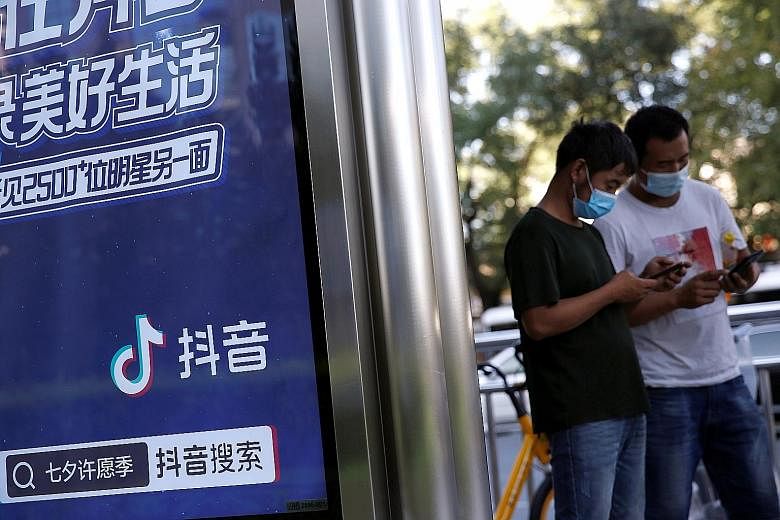WASHINGTON • As the sale of TikTok enters its final stages, Beijing is saying it wants the last word.
In a bureaucratic two-step, China late on Friday updated its export control rules to cover a variety of technologies it deemed sensitive, including technology that sounded much like TikTok's personalised recommendation engine.
The changes mean Chinese Internet giant ByteDance will be required to seek Chinese government approval to sell the US operations of its short-video app, according to a person familiar with the matter.
The new restrictions cover technologies ByteDance uses in TikTok and will require the company to seek government approval for any deal, according to the person, asking not to be identified because the details are not public. The new rule is aimed at delaying the sale and is not an outright ban, the person said.
On Saturday, the country's official Xinhua news agency published commentary by a professor who said the new rule would mean that the video app's parent ByteDance might need a licence to sell its technology to an American suitor.
Beijing's last-minute assertion of authority is an unexpected wrinkle for a deal as two groups race to buy TikTok's United States operations before the Trump administration bans the app.
Beijing's moves ensnare TikTok and potential American buyers including Microsoft and Oracle, wedging them in the middle of a tussle between the US and China over the future of global technology.
Beijing's displeasure alone could scare off TikTok's suitors, many of whom have operations in China.
TikTok is the most globally successful app ever produced by a Chinese firm, and the conflict over its fate could further fracture the Internet and plunge the world's two largest economies into a deeper stand-off. "At a minimum, they're flexing their muscles and saying, 'we get a say in this and we're not going to be bystanders'," said senior adviser Scott Kennedy at the Washington-based Centre for Strategic and International Studies, who studies Chinese economic policy.
"It could be an effort to outright block the sale, or just raise the price, or attach conditions to it to give China leverage down the road," he said, adding that it showed a rare bit of consensus between China and the US that both agreed ByteDance was a national security priority.
If Beijing blocks the sale of TikTok, it would effectively be calling the Trump administration's bluff, forcing the US government to go through with restricting the app and potentially incurring the wrath of its legions of influencers and fans.
Ordering firms like Apple and Google to take down TikTok in app stores globally could also prompt further anger against the Trump administration and even lawsuits.
China's changes to its export rules came just as ByteDance had signalled that it was close to reaching a resolution on the future of TikTok's business in the US. President Donald Trump this month issued an executive order restricting Americans' dealings with TikTok from the middle of next month.
He and other White House officials said the app could be a Trojan horse for data gathering by the Chinese Communist Party, an accusation that ByteDance has denied. That set off the deal negotiations.
Chinese officials have denounced the US treatment of TikTok, characterising it as "bullying".
In Friday's update to the export control rules, China's Commerce Ministry and its Science and Technology Ministry restricted the export of "technology based on data analysis for personalised information recommendation services".
TikTok plays up its ability to use technology to understand users' interests and fill their feeds with more of what they will enjoy watching.
In the Xinhua report, professor of international trade Cui Fan, from China's University of International Business and Economics, said that ByteDance's technologies would most likely be covered by the new export controls.
"If ByteDance plans to export relevant technologies, it should go through the licensing procedures," Xinhua cited Prof Cui as saying.
Any sale of TikTok would most likely require the transfer overseas of code and technical services.
"It is recommended that ByteDance seriously study the adjusted catalogue, and carefully consider whether it is necessary to suspend the substantive negotiation of related transactions, perform the legal declaration procedures and then take further actions as appropriate," Prof Cui was quoted as saying.
Dr Kennedy said it was exceedingly rare for a professor to make comments about a specific, in-progress deal, and that it signalled that ByteDance would now have to consult the Chinese authorities about the controls.
China has previously used bureaucratic procedure to block commercial deals without appearing to do so outright.
In 2018, Qualcomm called off a US$44 billion (S$60 billion) deal to buy Dutch chipmaker NXP Semiconductors after Chinese regulators simply failed to either approve or reject the transaction.
Beijing's prolonged anti-trust review was seen as a form of leverage over trade talks with the Trump administration, though China's Commerce Ministry denied that the two matters were related.
The use of export controls was novel, but it mirrors similar regulatory hurdles thrown at Chinese firms by the Trump administration.
The White House order that prompted TikTok's sale cited national security concerns, and the US has repeatedly blocked Chinese bids for companies with sensitive technologies and data.
NYTIMES, BLOOMBERG

